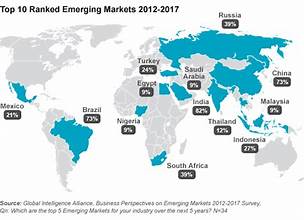
In recent years, emerging markets have increasingly become pivotal players in the global trade landscape. As we approach 2024, several key trends are reshaping the dynamics of global trade power. This article explores these trends, shedding light on how emerging markets are influencing the global economy and what to expect in the near future.
1. The Rise of Emerging Economies
Emerging markets, particularly in Asia and Africa, are experiencing rapid economic growth, which is shifting the balance of global trade power. Countries like China, India, Vietnam, and Nigeria are not only expanding their domestic markets but also becoming major exporters and importers. This growth is driven by several factors:
- Economic Reforms: Many emerging economies are implementing economic reforms that boost business climates, attract foreign investment, and enhance trade relationships.
- Technological Advancements: The adoption of technology and innovation is propelling productivity and efficiency, making these markets more competitive globally.
- Demographic Trends: Growing middle classes in these regions are driving increased consumption and demand for goods and services, influencing global trade patterns.
2. Diversification of Trade Partners
Emerging markets are diversifying their trade partners to mitigate risks and capitalize on new opportunities. This trend is evident in:
- Regional Trade Agreements: Countries are forming regional trade agreements to enhance intra-regional trade. For instance, the Regional Comprehensive Economic Partnership (RCEP) includes key players like China and India and aims to streamline trade within Asia.
- New Trade Routes: The Belt and Road Initiative (BRI) by China is establishing new trade routes and infrastructure projects across Asia, Africa, and Europe, which is reshaping global trade routes and increasing connectivity.
3. The Impact of Geopolitical Tensions
Geopolitical tensions are influencing trade dynamics in 2024. The ongoing trade disputes between major economies, such as the U.S.-China trade war, have led to shifts in global supply chains. Emerging markets are becoming alternative hubs for manufacturing and sourcing as companies seek to reduce dependency on traditional trade partners. This shift is driven by:
- Tariffs and Trade Barriers: Trade disputes and tariffs have prompted companies to seek more stable and predictable trade environments, leading to increased investment in emerging markets.
- Supply Chain Resilience: Emerging markets are enhancing their infrastructure and capabilities to provide more resilient and diversified supply chains.
4. Technological Integration in Trade
Technological integration is revolutionizing global trade, with emerging markets playing a significant role. Key technological trends include:
- Digital Trade Platforms: The rise of e-commerce and digital trade platforms is allowing businesses in emerging markets to reach global customers more efficiently. Platforms like Alibaba and Amazon are expanding their reach into these markets.
- Blockchain Technology: Blockchain is being utilized to enhance transparency and efficiency in trade transactions. Emerging markets are increasingly adopting blockchain solutions to streamline trade processes and reduce fraud.
5. Sustainable Trade Practices
Sustainability is becoming a critical focus in global trade. Emerging markets are adopting sustainable practices to meet global standards and attract investment. Key trends include:
- Green Initiatives: Many emerging economies are investing in green technologies and sustainable practices, such as renewable energy and eco-friendly manufacturing processes.
- Corporate Social Responsibility (CSR): Companies in emerging markets are emphasizing CSR to enhance their global reputation and align with international sustainability goals.
6. Investment in Infrastructure
Infrastructure development is a crucial factor in the rise of emerging markets. Investments in transportation, logistics, and communication infrastructure are enhancing trade efficiency and connectivity. Key areas of focus include:
- Port Development: Upgrades to ports and shipping facilities are improving the ability of emerging markets to handle increased trade volumes and reduce transit times.
- Transport Networks: Investments in road, rail, and air transport networks are facilitating smoother and more efficient movement of goods.
7. Changes in Consumer Behavior
Consumer behavior in emerging markets is evolving, impacting global trade patterns. Factors driving these changes include:
- Increased Purchasing Power: The growing middle class in emerging markets is driving higher demand for a diverse range of products and services, influencing global trade flows.
- Shift in Preferences: Consumers in these markets are increasingly favoring international brands and products, creating new opportunities for global businesses.
Conclusion
The shift in global trade power towards emerging markets is a defining trend for 2024. As these economies continue to grow and evolve, they will play an increasingly central role in shaping global trade dynamics. Businesses and policymakers must stay informed about these trends to navigate the changing landscape and seize new opportunities in the global market.
By understanding these emerging trends and adapting strategies accordingly, stakeholders can better position themselves in the evolving global trade environment and capitalize on the opportunities presented by the rise of emerging markets.

